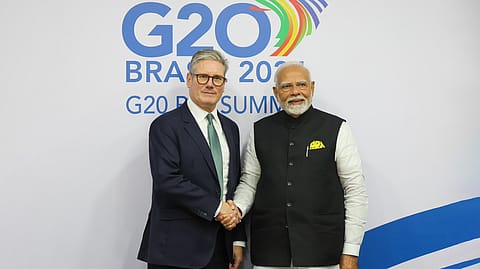UK PM Keir Starmer to visit India for the first time on October 8-9
PM Modi visited the UK in July, where the two countries signed the landmark free trade agreement—the India-UK Comprehensive Economic and Trade Agreement—which is touted as a central pillar of the future of the India–UK economic partnership.

Keir Starmer, the Prime Minister of the United Kingdom, will make his first official visit to India on October 8 and 9, the Ministry of External Affairs said in a statement on Saturday.
According to press communique issued by the ministry, during the visit, on October 9 in Mumbai, the two Prime Ministers will take stock of progress in diverse aspects of the India-UK Comprehensive Strategic Partnership in line with ‘Vision 2035’, a focused and time-bound 10-year Roadmap of programmes and initiatives in key pillars of trade and investment, technology and innovation, defence and security, climate and energy, health, education and people to people relations.
Both leaders are also expected to engage with businesses and industry leaders on the opportunities presented by the India-UK Comprehensive Economic and Trade Agreement (CETA), which will serve as a central pillar of the future India–UK economic partnership. They will also exchange views on issues of regional and global importance.
Prime Minister Modi and Prime Minister Starmer will also attend the sixth edition of the Global Fintech Fest in Mumbai and deliver keynote addresses. The leaders will also engage with industry experts, policymakers and innovators.
Starmer’s visit comes close on the heels of PM Modi’s visit to the UK in July, where the two countries officially announced the signing of the CETA, which is the free trade agreement between India and the UK. The agreement is currently being ratified and is expected to come into effect next year.
CETA brings in significant advantages to the domestic manufacturing and labour-intensive sectors. The UK-India pact is expected to provide a substantial boost to India’s engineering exports to the UK. With 10 deals in place now, India’s engineering exports to the UK are expected to double to $7.5 billion by FY30.
The agreement unlocks export opportunities for labour-intensive sectors, including textiles, leather, footwear, gems and jewellery, marine products, and toys—generating large-scale employment and empowering artisans, women-led enterprises, and MSMEs. The deal provides unprecedented market access for Indian goods, offering zero-duty access on 99% of tariff lines and covering nearly 100% of the trade value.